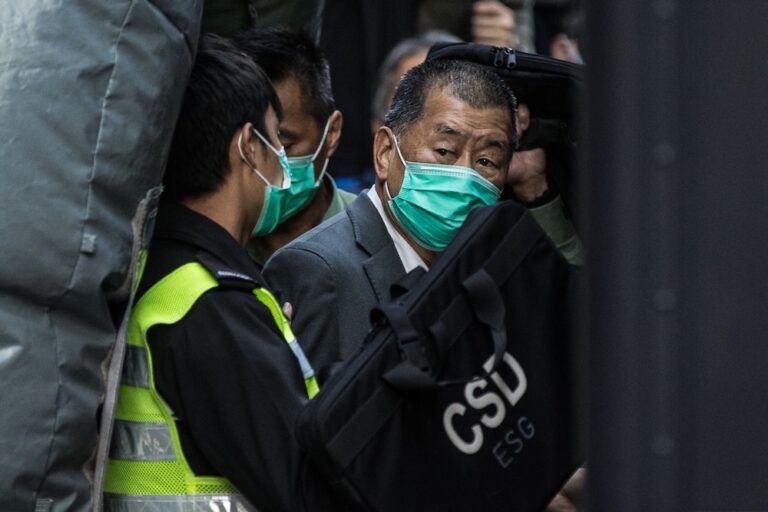In this cynical ménage à trois, it's human rights that gets tossed aside when no longer needed.
(WiPC/IFEX) – July 26 2012 – In this cynical ménage à trois, it’s always human rights that gets booted out of bed right after sex.
Two examples: the Beijing Olympics and Bahrain Grand Prix.
In Bahrain earlier this year, Formula One made a triumphant return, having cancelled the Bahrain Grand Prix one year previous, because of a protracted and bloody crackdown on dissidents. The Bahrain regime was desperate to remount the Grand Prix, as part of the highly managed rehabilitation of its reputation, which began with the publication of the Bahrain Independent Commission of Inquiry report in November 2011. Despite energetic promises to implement the recommendations of the BICI report, the regime has become even more repressive, utterly failing to bring perpetrators of abuses including well-documented torture to justice, and escalating crackdowns on dissidents.
And yet, Bahrain was deemed “safe” for the invasion of a pack of foreign millionaires in fast cars (it happens that the Bahrain royal family owns 40% of one of the Formula One teams). The Guardian describes Formula One thus: . . . a too-cosy arrangement of rich teams, super-wealthy “athletes” – if they can be called such – sponsors and grand prix-staging countries whose interest is more about the bottom line and prestige than competition.
Formula One came and went; the Bahrain regime basks in the implicit endorsement by the world at large, and the explicit conclusion of an arms deal with the American government. The human rights abuses against Bahraini citizens can go on.
On the eve of this year’s Olympic Games, it’s worth pausing to ask: what did happen in China after the Beijing Olympics?
Prior to securing the 2008 Olympic Games for Beijing, China pledged a range of human rights improvements, including freedom of the press. And yet, foreign journalists in China were consistently prevented from reporting freely on issues throughout China before and during the Olympics, despite regulations guaranteeing this freedom. Domestic journalists were never afforded the press freedom protections given to foreign journalists. At least 12 writers were detained in China in the 8 months leading up to the Olympics, resulting in a total of 44 writers in prison at the close of the Games in August 2008.
Four years later? There are currently between 40 and 50 writers and intellectuals imprisoned in China, including the 2010 Nobel Peace Laureate, Liu Xiaobo. Sentences for freedom of expression “crimes” have become very stiff – seven, nine, ten years. In the aftermath of the Arab Spring, fears of a Jasmine Revolution in China led to the prolonged and completely illegal detentions of hundreds, possibly thousands of Chinese citizens.
The government has strengthened its infamous Firewall and instigated myriad ways of intimidating, monitoring and punishing the users of social media sites. Access to Facebook, YouTube and Twitter is forbidden in China. The online censoring of individual words immediately before or after events provoking the ire of Chinese citizens (a train wreck, a Communist Party scandal) has become endemic. All this in the name of China’s top policy priority, “maintaining stability.”
China’s Peoples Daily Online recently declared that “the Beijing Olympic Games were widely regarded as the best ever.” China was both affirmed and emboldened by it triumphalist Games and subsequent economic ascension. It has no fear of disapproval from the international community.
And unscrupulous ménages a trois can thrive. Sport, in this trio, is not actually the splendid achievements of individual athletes which, as fellow human beings we are thrilled by, but the multi-billion dollar enterprises that, in smooth collusion with repressive regimes, are able to co-opt human athletic performance into propaganda juggernauts.
Politics is the complex game played by governments to mollify other governments into comfy bilateral trade agreements, mutually beneficial investment and arms deals.
Human rights is the hapless handmaiden, briefly engaged with to make things look pretty, but always tossed aside when no longer needed.
The hopes for democratization in both Bahrain and China reside in the citizens of both countries. While both regimes cast their citizens as the enemy, those citizens are making their voices heard, largely via social media in China, and via both social media and street protests in Bahrain. They are not fooled by cynical liaisons and they are making those regimes nervous.


